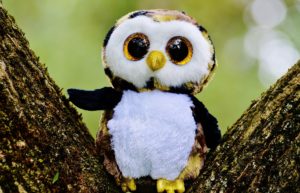 Animals and people have a lot in common, if language is any indicator (something that shows the current state or level of something). We compare people to animals all the time, whether it’s because of their appearance (how they look), personality traits (characteristics), or behavior.
Animals and people have a lot in common, if language is any indicator (something that shows the current state or level of something). We compare people to animals all the time, whether it’s because of their appearance (how they look), personality traits (characteristics), or behavior.
Let’s take a look at a few of the most common expressions we use to talk about people’s personalities.
If someone is stubborn (not willing to change their attitude or opinion), they can be called “pigheaded.” We can also say that they’re “as stubborn as a mule” (an animal born to a female horse and a male donkey).
Intelligent people are sometimes described as being “as wise as an owl” (a large bird with round eyes and the ability to turn its head almost in a full circle and is awake at night). And you might hear people say “an elephant never forgets,” referring to a general belief that elephants have long memories (the ability to remember things for a long period of time). (Elephants are very large animals with a long nose called a “trunk.”)
Lions are generally thought to be brave (courageous, not scared of things). But a chicken is someone who is afraid to do something. The phrase “to chicken out” means to change one’s mind and decide not to do something because one is too scared.
Someone who is very enthusiastic (wanting to do something and looking forward to it) about doing something, especially work, can be described as an eager beaver (a rodent-like animal with a large, flat tail that uses its teeth to cut down trees and use them to block rivers to create ponds).
Someone who is nervous, shy, quiet, and lacking (being without) an interesting personality may be called “mousy.” Similarly, shy people are sometimes described as being “as quiet as a mouse.”
Someone who has a lot to say but suddenly stops talking is said to “clam up,” because a clam is a sea animal that lives between two round shells that can close like the lips of a person who doesn’t want to speak.
Finally, people who “eat like a bird” eat very little. The phrase “to pig out” means to eat a lot of something, and people who “eat like a horse” eat a lot of food.
~ ESLPod Team
Well , reading the latest Lucy’s post this morning, I realized that I never stoped and appreciate over-10-year Lucy ‘s dialogs that in fact was the drive that pulled us all here three times a week for -boy ,a very very long time.
Eslpod shut down the audio lessons for good ,yet Lucy’s dialogs live on. I still read through them like I used to.
Man ,there is a certain air of nostalgia about them.
Reading through Lucy ‘s post today ,I realized I never stopped to thank Lucy for all the dialogs that helped me familiar myself to the ways of the land.
Thanks Lucy for all you have done for us.
Ur dialogs and beautiful ,strong American accent.
Guess what ,listening to you ,my lousy accent has significantly improved
Well , I have been trying all these years to mimic ur way of talk.
U have always been my personal hero Lucy
Thanks for always being there for me.
I learned a great deal
In fact
If sometimes it happens that someone wonders
How I got that far given the time of my stay here
My response is always
” Well, what can I say,
I m made in eslpod ”
Yours
🙂
Pete
Hello!
In Spanish, being a donkey is to be ignorant or uninteligent, what to my view is quite unfair. Close to the extinction nowadays these animals used as beast of burden, usually bore much more load that could stand.
Poor donkeys! I emphatize with them.
Bye,
Maricarmen
As for all the animal related expressions u lined up there for our benefits I must say there are tons of more out there
Well
In all fairness ,you addressed the most popular ones ,i think
Well, there is a sh.t load of relevant expression with ” fox and cat
Like
A good cat nap
U know what i have always find fascinating is animal expressions are totally skewed
I mean one animal gets a lot of attention and another ,at the same time ,is totally left out
I mean
The big question-to me -at least is “who decides?”
I means who decides which expressions assign to which animal
Seriously ,who decides ?
Any insight ?
🙂
Pete
Hi,
Nice topic. In my language we talk with little children in this way.
Are you a little pig, little mouse, or little dog?
No, a little boy. All these words rhyme and it’s very funny for kids.
To me it’s a pleasure to invent new words with rhyme just for a smile
of a kid.
A sincere smile to you all,
Tania
Hi,
In my country, many mothers call their little children “chicken”, as they
are so fragile, are afraid to do something.
I like this word like a caress .
Hi,
Dear Emiliano, thank you for your nice words to me.
I’ll try to write more, but I do not know when.
Much health to you and Cuca.
Tania